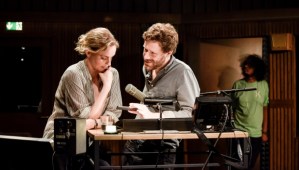Review: Returning to Reims (HOME, MIF)
Schaubühne’s Thomas Ostermeier adapts Didier Eribon’s bestselling memoir for this world premiere at MIF
It's rare to find a piece of theatre as acutely topical, deeply intelligent, and emotionally charged as Returning to Reims. But this late addition to the Manchester International Festival's programme is very special indeed in very many ways.
Created by Thomas Ostermeier's outstanding Berlin-based Schaubühne company in just a matter of months, it takes as its starting point the French sociologist Didier Eribon's 2009 memoir of the same name. In his book, Eribon, who has been estranged from his family for 30 years, begins to reconcile with his mother just as his father is on the point of dying.
He refuses to see him or to go to his funeral – "I didn't love him. I never had" – but the event forces him to explore his own rejection of his working class origins, and the reasons why his father, and so many like him, moved from support of the Communist party to an affiliation with Marine Le Pen's Front National.
What we see on stage is a recording studio, with a booth to one side. Here three people – an actress (Nina Hoss, familiar to fans of Homeland), a film-maker (Bush Moukarzel) and the studio manager are making a film about Eribon's life. For the first half of the two-hour running time, we see Hoss sitting quietly at the microphone and listen to her hypnotic recitation of the book while overhead we see a film (actually made by Ostermeier and Sébastien Dupouey) which shows Eribon returning to Reims and sitting with his mother.
This is in itself fascinating. The images of what Eribon calls the "violence of the social world" and its impact on the bodies and faces of the poor and the semi-derelict, uncaring poverty in which he grew up are profoundly powerful. But then Hoss starts to have an argument with Moukarzel about the cuts he has made in the text; Eribon blames evil forces for the conditions in which the working class are forced to live. The film-maker prefers to put the responsibility on the system. Then she objects to images of resistance to the Far-Right accompanying text which describes its rise; "I'm a multi-layered film-maker. It's my style," he announces, before denouncing her from the studio booth as "a typical actress who thinks she knows better than me."
It's funny and acute, a revelation of the tensions that go into the creation of a work of art in itself. But it also announces its own multi-layered transformation in the second part, where as the trio make the film, more and more issues from their own concerns become entwined in the piece. The studio manager – Ali Gadema (off-stage a theatre maker and poet in his own right) contributes a sharply political rap. The audience – us – are invited to respond.
In his role as film-maker Moukarzel (in real life co-artistic director of the Irish theatre company Dead Centre) adds footage of Gordon Brown attacking "that bigoted woman" – an erstwhile Labour supporter in Rochdale – to Eribon's critique of the failure of the Left.
Finally, wonderfully, Hoss talks about her own father Willi, an idealistic trade unionist who ends his life helping the indigenous people of the Amazon fight the destruction of the rain forest. His belief in small personal acts of resistance against social violence are implicitly set against Eribon's bleaker analysis of the need for another perspective to realign the politics of the Left with the oppressed rather than the governing class.
All of this is performed in a naturalistic style so real, so embracing, that it feels like a conversation over the breakfast table not from a stage. It is held together by Hoss who has the most beautiful, intelligent presence that illuminates the entire stage, and lends it warmth and grace.
Returning to Reims is not easy theatre, it is bold, committed and infinitely resonant. It's distinguished by its intellectual rigour – Eribon's analysis is darkly persuasive – but also by its sense of hope and humanity.
Because it directly tackles the most pressing issues of our day, with a sense of rich discovery and revelation, it feels like essential viewing, a vindication of experiment and thoughtfulness, a celebration of the skills of performers. It is the lifeblood of a festival of new work such as this one. Since it is on until 14 July, you have a chance to catch it while you can. You won't forget it.
Returning to Reims runs at HOME Manchester, as part of the Manchester International Festival until 14 July 2017.













